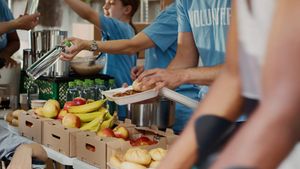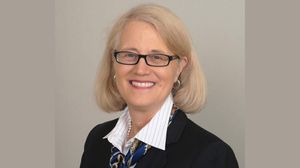Treatment GuideJust DiagnosedSex & DatingAfrican AmericanStigmaAsk the HIV DocPrEP En EspañolNewsVoicesPrint IssueVideoOut 100
CONTACTCAREER OPPORTUNITIESADVERTISE WITH USPRIVACY POLICYPRIVACY PREFERENCESTERMS OF USELEGAL NOTICE
© 2025 Pride Publishing Inc.
All Rights reserved
All Rights reserved
By continuing to use our site, you agree to our Privacy Policy and Terms of Use.
Elaine Rodgers did not think she would ever have to worry about HIV in her life. Whenever she thought about AIDS, she says, she imagined 'white gay males and men who lived a loose and raggedy life, who were skinny and had a lot of health problems.' And that was not her. True, she had had a 'promiscuous past,' as she describes it. But she was a large, healthy African-American mother of three. But in March 2000, Rodgers's belief system was turned upside down. Her 2-year-old son, who had been sickly since he was 6 weeks old, developed pneumonia, and their pediatrician referred him to a special children's clinic. 'The specialist was concerned not with the pneumonia but with the fact he had been wearing the same shoe size for a long time and was not thriving,' Rodgers recalls. 'She told me we needed to do a battery of tests and that it could be one of three things'leukemia, cystic fibrosis, or HIV. I was hoping to God it was leukemia or cystic fibrosis, because I knew if it was HIV, that I was the culprit.' Three days later Rodgers learned the news that would change her life: It was indeed HIV. 'I was devastated,' she says. 'I thought I was going to lose my mind. But I didn't have time for denial because my baby was so sick and he had to be put on medication immediately.' Shortly thereafter, Rodgers attended a meeting on how to provide care to HIV-positive children. 'It was the first time I was around other HIV-positive moms,' she says. 'And they, like me, didn't fit the bill that I thought HIV looked like. They were plump and had kids, and some had negative husbands. It confirmed for me why I had been so ignorant. These women didn't look like what I thought they'd look like. They looked like me.' Making Way for Change Today, Rodgers, 37, is immersed in the world of HIV. For the past four years she has worked as an HIV care advocate at the family clinic in the pediatrics department at the University of Alabama at Birmingham. And she is now an adviser to a groundbreaking new UAB program called Making Our Mothers Stronger, whose goal is to reduce the stress that HIV-positive mothers experience when caring for themselves and their children. 'Being a mom is a stressful job, and then there is the separate but compounding stress of having HIV,' says Susan Davies, Ph.D., an assistant professor of health behavior at UAB who is spearheading the MOMS project. 'What we don't yet know is which would be most beneficial to HIV-positive moms: reducing the stress related to HIV or reducing the stress related to parenting.' The MOMS program, believed to be the first of its kind in the country, is designed to answer that question. It will enroll 240 HIV-positive women who have a child between the age of 5 and 11 in a study designed to evaluate two different six-week stress education programs. One education program will focus on helping women cope with HIV-related issues, such as monitoring their own health, complying with medication regimens, and communicating with health care providers. The other will focus on coping with the stress of parenting and improving parenting skills. To evaluate the programs, the women's stress levels will be assessed before and after they complete the educational sessions. Davies will use this information, along with the women's feedback about which aspects of each program were most beneficial, to create a model stress-reduction program that can be replicated by HIV service providers nationwide. Layers of Concern All HIVers experience some level of stress related to their illness. But having children adds another dimension. Many mothers fear that their children will be stigmatized because of their HIV disease; virtually all worry about who will care for their children if they die. Fear of dying can also affect how a woman parents. 'HIV-positive moms often have a difficult time disciplining their children because they want to be remembered in a positive light,' Davies says. 'But if you don't have structure and rules and discipline, raising children can be even more stressful.' Stress appears to decrease the immune system's response and increase the risk for infections. Some studies have found that high levels of stress can cause HIV to progress faster to AIDS, while others have found that people with high stress levels do not have as robust a response to antiretroviral drugs. Why this occurs is not clear. It could be that individuals who are stressed do not make or keep the doctor's appointments that could help them ward off disease progression; they may also be more likely to smoke or use drugs or alcohol, which can affect the immune system. It is also possible that stress is a catalyst for the release of certain hormones that affect the neuroendocrine system'the hormones that affect the brain'and that can have a negative effect on the immune system. But whatever the cause, it is clear that helping HIV-positive moms learn how to handle stress has the potential to keep them healthier longer. Ellen Johnson Silver, Ph.D., an assistant professor of pediatrics at Albert Einstein College of Medicine, located in New York, has conducted research on the stresses HIV-positive mothers experience. She says she was interested to learn that a program like MOMS was under way. 'I think a program like this will be very helpful, because HIV-positive mothers need to know that there are other people like them,' Silver says. 'Isolation is a big problem for these kinds of families.' Misty Caldwell, a 53-year-old HIV-positive mom, is, like Rodgers, a MOMS community leader who is helping enroll women in the MOMS program. She too is eager to help other HIV-positive moms connect with and learn from one another. 'I jumped at the chance to be a part of this program because I want to try to help other women,' Caldwell says. 'We have young mothers who have the stress of being HIV-positive and being a parent who also have to struggle with our [African-American] community and the churches that still lack the education to understand this disease.' Within this context, the MOMS program has the potential to significantly affect many HIV-positive women's lives. 'What I love about this program,' Rodgers says, 'is the techniques that women are going to learn that will help them destress their lives. But what I'm looking forward to is the sisterhood that will come about as well.'
From our Sponsors
Most Popular
BREAKING: Supreme Court rules to save free access to preventive care, including PrEP
June 27 2025 10:32 AM
Thanks to U=U, HIV-positive people can live long, happy, healthy lives
July 25 2025 2:37 PM
Plus: Featured Video
Latest Stories
Amazing People of 2025: Javier Muñoz
October 17 2025 7:35 PM
It’s National PrEP Day! Learn the latest about HIV prevention
October 10 2025 9:00 AM
“I am the steward of my ship”: John Gibson rewrites his HIV narrative
September 16 2025 2:56 PM
“So much life to live”: Eric Nieves on thriving with HIV
September 03 2025 11:37 AM
The Talk: Owning your voice
August 25 2025 8:16 PM
The lab coat just got queer
August 21 2025 10:00 AM
Messenger RNA could be the key to an HIV vaccine — but government cuts pose a threat
August 20 2025 8:02 AM
The Talk: Beyond the exam room
August 13 2025 3:15 PM
The Talk: Navigating your treatment
August 01 2025 6:02 PM
The Talk: Starting the conversation
July 25 2025 4:47 PM
How the Black AIDS Institute continues to fill in the gaps
July 25 2025 1:06 PM
“I felt like a butterfly”: Niko Flowers on reclaiming life with HIV
July 23 2025 12:22 PM
Dancer. Healer. Survivor. DéShaun Armbrister is all of the above
July 02 2025 8:23 PM
1985: the year the AIDS crisis finally broke through the silence
June 26 2025 11:24 AM
VIDEO: A man living with HIV discusses his journey to fatherhood
June 10 2025 4:58 PM
Trump admin guts $258 million in funding for HIV vaccine research
June 03 2025 3:47 PM
Grindr is reminding us why jockstraps are so sexy and iconic
May 02 2025 5:36 PM
HRC holds 'die-in' to protest Trump health care cuts
April 28 2025 2:11 PM


































































